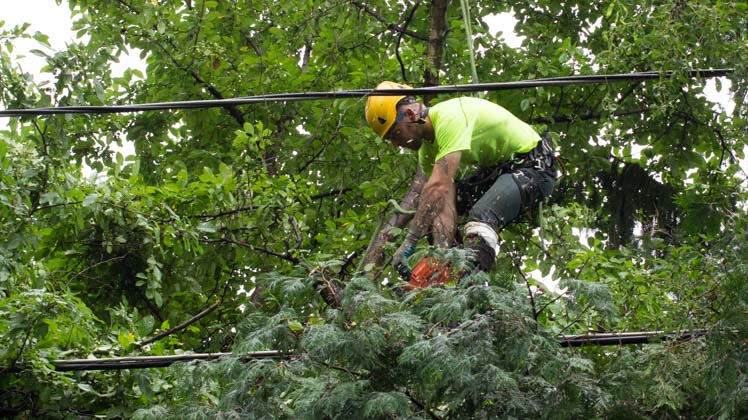Tree Work and Vegetation Management

Taking care of trees and power lines go hand-in-hand
We are proud to provide reliable, essential electricity service. When service is interrupted, it is most often due to a tree contacting power lines. To minimize interruptions, we prune and remove trees and vegetation in our rights of ways and encourage planting the right tree in the right place. Learn more below and learn how protect trees by visiting the NYS Department of Environmental Conservation website.
Removing Trees Near Distribution Lines
For distribution lines – the power lines that deliver electricity to homes and businesses – we may prune trees and vegetation or remove them depending on the situation. Any pruning we do follows American National Standards Institute (ANSI) standards and Tree Care Industry Association (TCIA) guidelines.
We Prune Trees Near Our Power Lines Only
We prune and sometimes remove trees and vegetation that could come into contact with our power lines. If you believe trees around utility lines need to be removed or pruned, we encourage you to contact the appropriate utility company - NYSEG, the cable company or the telephone company. Do not attempt this work yourself.
Here are some additional safety tips:
- Never attempt to remove tree debris when any downed lines may be entangled in the debris.
- Leave cutting and pruning of trees near power lines to professionals. A tree or limb that contacts a power line could be deadly.
- Remind children not to climb trees near power lines or climb on pad-mounted transformers.
- Avoid planting new trees under power lines and follow our planting tips.
Our tree debris removal policy:
- During scheduled maintenance tree work in residential and landscaped areas, we chip and remove smaller branches less than six inches and cut larger ones into manageable lengths and leave onsite.
- When customers request that we clear vegetation outside of our scheduled maintenance or in rural, non-landscaped areas, we leave the cut material behind for customer disposal.
- Following a storm, our first priority is to restore service safely and as quickly and efficiently as possible, so when we have to cut vegetation, we leave cut materials behind for customer disposal or to naturally decompose.
Natural Trimming Methods
In yards and other landscaped areas, trees will be pruned using natural pruning methods established by the American National Standards Institute (ANSI) standards and Tree Care Industry Association (TCIA) guidelines. (Please note that during an emergency we may not be able to adhere to the natural pruning method.) This pruning method involves cutting limbs where the tree would normally shed them and directing future growth away from power lines. While a newly pruned tree will look different, natural pruning protects the health of the tree, minimizes regrowth and requires fewer cuts. We will not paint pruned trees with tree wound dressings. Such dressings are cosmetic and do not stop decay. In fact, some studies show them to have a detrimental effect.
Selective Tree Removal
In rural and wooded areas, tree removal is an effective and economical method for controlling vegetation. Whenever practical, trees that are likely to grow into power lines will be removed. Tree removal is the best option when pruning alone cannot achieve adequate clearance from power lines.
Download our free Tree Work information sheet.
Did you know?
Trees are the leading cause of power interruptions, accounting for nearly half of all interruptions.
Choose the right professional for trimming trees
We only clear trees, branches and vegetation near our electric lines. We do not prune around lines owned by cable or phone companies or remove vegetation that is not interfering with our lines. Never attempt to prune trees near power lines; leave that to professionals.
Vegetation Management and Reclamation Program
- Vegetation Management & Reclamation Program Fact Sheet
- Vegetation Management & Reclamation Program FAQ
- 2024 Project List
More Information
- Don't move firewood: Follow the law to keep our forests safe!
- Have ash trees? Learn more about the emerald ash borer.
- Dig safe when planting
- Transmission Lines, Trees and Vegetation
If you have specific questions regarding the program, please contact us at 800.572.1111, or email us at ny.vegetation.management@avangrid.com using Tree Trimming in your subject line.
